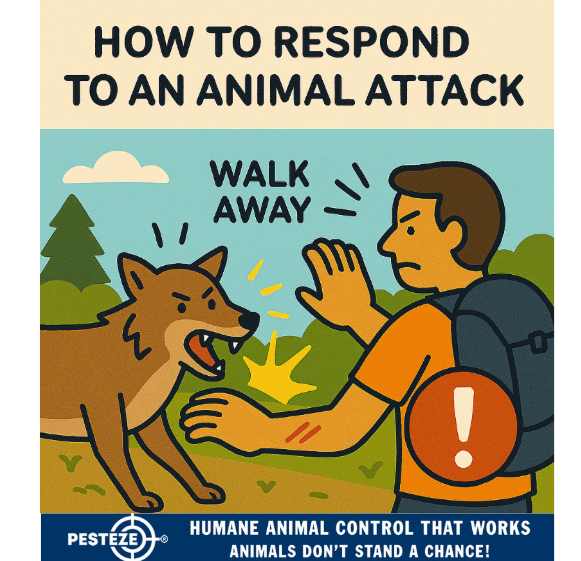HOW TO RESPOND TO AN ANIMAL ATTACK

HOW TO RESPOND TO AN ANIMAL ATTACK
SUMMARY
Animal attacks are rare but can be life-threatening when they occur. Whether you're hiking in the wilderness or encountering aggressive wildlife near your home, knowing how to respond quickly and effectively is critical. This guide provides essential safety strategies to protect yourself during an animal attack, minimize injury, and seek help. From defensive techniques to post-attack procedures, you’ll learn how to stay calm, act smart, and survive the encounter.
FEATURES
-
Stay Calm Under Pressure: Learn how to control panic and think clearly during an attack.
-
Use Defensive Tools: Discover how bear spray, sticks, or noise can help deter aggressive animals.
-
Protect Vital Areas: Shield your head, neck, and torso to reduce serious injury.
-
Fight Back When Necessary: Know when and how to defend yourself against different species.
-
Seek Immediate Medical Help: Understand the importance of treating bites, scratches, and trauma.
-
Report the Incident: Notify wildlife authorities to prevent future attacks and aid public safety.
GUIDE DESCRIPTION
Facing an animal attack is a terrifying experience, but your response can determine the outcome. This guide outlines critical steps to take before, during, and after an attack to protect yourself and others.
The first rule is to stay calm. Panic can cloud judgment and make you more vulnerable. Take deep breaths and focus on assessing the situation. If the animal is still approaching, use any available deterrents—bear spray, loud noises, or objects like sticks or rocks—to create distance.
If physical contact occurs, protect your vital areas. Curl into a ball to shield your head and neck, or use your arms to block bites and claws. For large predators like bears or mountain lions, playing dead may work in some cases, while fighting back is necessary in others. Aim for sensitive areas like the eyes, nose, or snout.
Once the animal retreats or the attack ends, seek medical attention immediately. Even minor bites or scratches can lead to infections or transmit diseases like rabies. Clean wounds thoroughly and get professional evaluation as soon as possible.
After receiving care, report the incident to local wildlife authorities. Provide details such as location, species, and behavior. This helps officials monitor animal activity and issue warnings if needed.
Preparation is key. Carry deterrents when in wildlife-prone areas, stay alert, and avoid known animal habitats during peak activity times. Educate yourself on species-specific behavior to know when to retreat or defend.
By responding calmly and strategically, you can survive an animal attack and help prevent future incidents through responsible reporting and awareness.
- Amy Chang


Comments 0